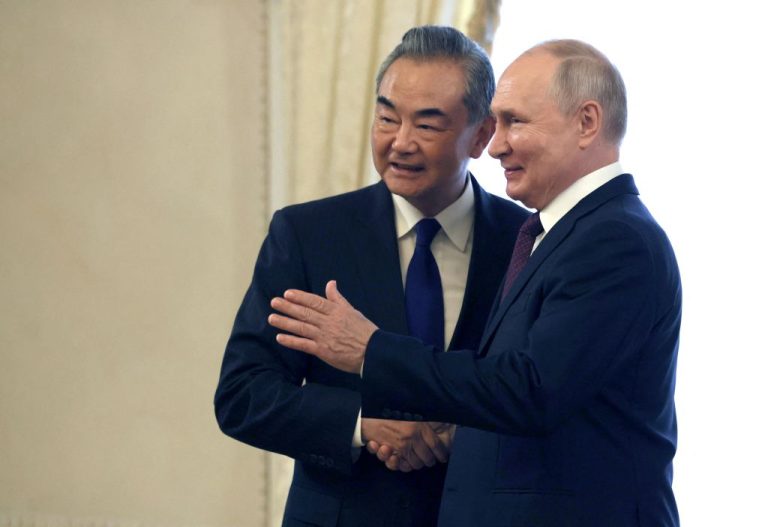On Sept. 19, it was revealed that China’s top diplomat, Wang Yi, had traveled to Russia for a “strategic security” dialogue with Russian foreign minister Sergei Lavrov. Experts noted the visit signals China’s interest in deepening ties with Moscow amid ongoing global tensions — with the high-profile meeting showcasing the complexity of international relations between China, Russia, North Korea, and the West.
On the Ukraine war
In their discussions, both Wang and Lavrov emphasized that any resolution to the Ukraine war should consider Moscow’s interests. “Any bid to end the war must take into account Moscow’s interests,” the pair were quoted as saying. Wang was also photographed with Russian President Vladimir Putin.
The Russian foreign ministry later pointed out that while both diplomats delved into the Ukraine conflict, they also “noted the futility of attempts to settle the crisis without taking account of Russia’s interests and, more particularly, its participation.”
While China has presented its own peace plan for Ukraine, it is clear from recent diplomatic efforts that Beijing is aiming to navigate a tricky path by toeing the line between keeping the peace with its neighbor to the North, while also trying to stay on relatively good terms with the West (particularly the U.S.) to avoid sanctions and try to salvage a struggling national economy.
RELATED: US Officials Highlight Depth of China’s Economic Crisis
Success
You are now signed up for our newsletter
Success
Check your email to complete sign up
China is eager to see the Ukraine conflict resolved to mend its ties with Europe and Washington, but is equally keen on keeping the blame game at bay, said Rorry Daniels from the Asia Society Policy Institute. Daniels highlighted China’s position by noting how the two nations want to “separate that outcome from determining who is to blame for the war.”
Allegations of support
Meanwhile, accusations have flown thick and fast with the U.S. pointing fingers at China for providing economic and technological aid to Russia during the war. According to a U.S. intelligence report, China allegedly “ramped-up energy trades” with Russia and the possible supply of dual-use technology items as a potential deployment of arms for Ukraine. However, Beijing has rebuffed these allegations by maintaining a relatively neutral stand on the conflict.
Russian media sources have also hinted that Wang’s trip is paving the way for a forthcoming visit by Putin to China. This development comes in the wake of Putin’s recent meeting with North Korean leader Kim Jong Un, which sparked concerns in the U.S. about potential arms deals and discussions on nuclear advancement.
MORE ON THIS: US and Japan Announce Joint Development of Hypersonic Missile Interceptors
Putin, who has been under scrutiny with an arrest warrant issued by the International Criminal Court over alleged war crimes in Ukraine, hasn’t traveled internationally since December 2022. Observers are speculating over whether the Russian President will make an appearance in China’s Belt and Road Forum slated for next month.
“Inviting Putin to China is a way to show support for Russia but that support must also be framed as a legitimate attempt to get Russia to the negotiating table so that China doesn’t worsen its position with the Europeans,” said Daniels in regards to the diplomatic game in play on Russia’s part.
On North Korea
According to local media reports, Kim Jong Un’s controversial trip to Russia ended with him securing several Russian-made items. The primary focus, however, was on the alleged discussions around North Korean arms sales to Russia — hinting at a possible arms shortage in Moscow.
Although Beijing refrained from commenting on this visit, experts believe that any collaboration between Russia and North Korea has China’s tacit approval, given their deep-rooted ties.
Dr. Alexander Korolev, a China-Russia relations specialist, told BBC News, “Whatever’s happening with Russia and North Korea cannot be happening without China knowing about it… It would be a smart move, if that is the case.”
Amid these developments, Wang also met with U.S. national security adviser Jake Sullivan in Malta recently. Their discussions extended beyond bilateral relations, covering regional security and the Ukraine war in meetings that lasted over 12 hours, AP News reported.
But as Dr. Korolev notes, China’s cooperation with Washington — especially concerning North Korea and the Russia-Ukraine war — remains uncertain. “If China wanted to play ball the American way, they had more than a year,” to take a firmer stance on Ukraine, but they haven’t done so, he said.















